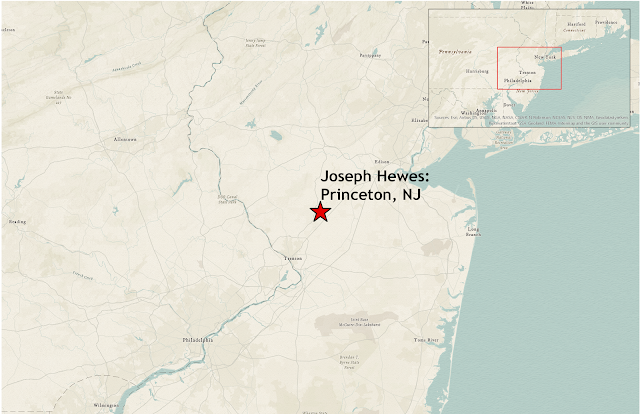Founding Fathers - Joseph Hewes
Joseph Hewes
Born: January 23, 1730 (Princeton, New Jersey)
Died: November 10, 1779 (Philadelphia, Pennsylvania)
Like many of the men who contributed to the birth of our nation, the focus of this week's study is a complex individual who seems to have had his share of personal contradictions. Joseph Hewes was born to Aaron and Providence Hewes in their family home called Maybury Hill situated between Kingston and Princeton, NJ. The Quaker couple, who had seemingly migrated to New Jersey from Connecticut in order to escape frequent Indian attacks as well as harsh treatment from the Puritan majority there, likely provided a strong education for young Joseph, possibly at the nearby grammar school that had been established by the Society of Friends. Not much has been recorded about his early years, but he was accepted into the College of New Jersey (now Princeton University) before moving to Philadelphia to be apprenticed to a successful merchant named Joseph Ogden. Joseph apparently learned and applied his trade well, and while still just in his 20s he had become successful in his own right. Seeking to expand his affluence, he left Pennsylvania for North Carolina in 1754.
After spending some time in Wilmington, NC, Joseph Hewes moved north to the town of Edenton in 1760. His shipping and mercantile business had become quite lucrative, and in addition to his growing fortune he rapidly developed a positive reputation amongst his peers. He became friends with Samuel Johnston, a political leader who would later serve as governor, and became engaged to his sister, Isabella. Tragically, the bride-to-be died just days before their wedding date, and Hewes would remain a bachelor for the rest of his life. He remained as close as family to the Johnstons, however, and Samuel soon convinced him to become involved in politics by seeking public office. In 1766, Hewes was elected to North Carolina's Provincial Assembly and held the seat until the body was dissolved by the royal governor in 1775. When the British enacted the Intolerable Acts in response to the Boston Tea Party, he was outspoken in support of answering the call from Massachusetts to create a unified Congress of all the colonies. Hewes was more in favor, however, of establishing this body in order to appeal to Parliament and the Crown through reasoning rather than rebellion. Because of his participation on the Committee of Correspondence and consistent support for the rights of citizens, North Carolina selected him as a delegate to both the First and Second Continental Congresses.
While serving in Philadelphia, Joseph Hewes did not always act in a predictable manner. As one of the moderates that preferred reconciliation, as long as it came with guaranteed rights and protections for the colonists, he nevertheless sacrificed his own profits by voting for non-importation measures against British goods. When King George III refused to consider either the Declaration of Rights and Grievances or the Olive Branch Petition, Hewes abandoned the pacifism of his Quaker heritage and voted for independence and war. He then sacrificed his entire merchant fleet to the cause, helping form and outfit the Continental Navy. Working as the Chairman for the Naval Committee, Hewes strongly advocated for his friend, John Paul Jones, but was unable to secure him a rank as Captain. Jones served as a Lieutenant but never forgot the friendship that led to him becoming the nation's first naval hero, never missing an opportunity to express praise and gratitude for his benefactor. Hewes remained a tireless worker on several committees in Congress, but his efforts began to take a toll on his health. Suffering from fatigue and headaches, he visited his mother who lived nearby and then returned to North Carolina to rest. Hewes was surprisingly not elected to return to Congress in 1777 and instead accepted a seat in the state legislature where he remained until North Carolina once again asked him to return to Congress in 1779. His second tenure was short-lived, as he fell ill and submitted his resignation just three months after arriving. Unable to travel due to his sickness, Hewes could not return to North Carolina and died in Philadelphia at the age of 49. The entire membership of Congress attended the funeral of the only signer to die at the seat of government, and they declared a month-long period of mourning. He had no heirs and the site of his burial was never marked, however, so by 1894 when North Carolina decided to rebury the remains of all three of their signers together, the grave of Hewes could not be found and was officially declared as lost.
The signature of Joseph Hewes can be found as the second name in the second column beneath the Declaration of Independence.



Comments
Post a Comment